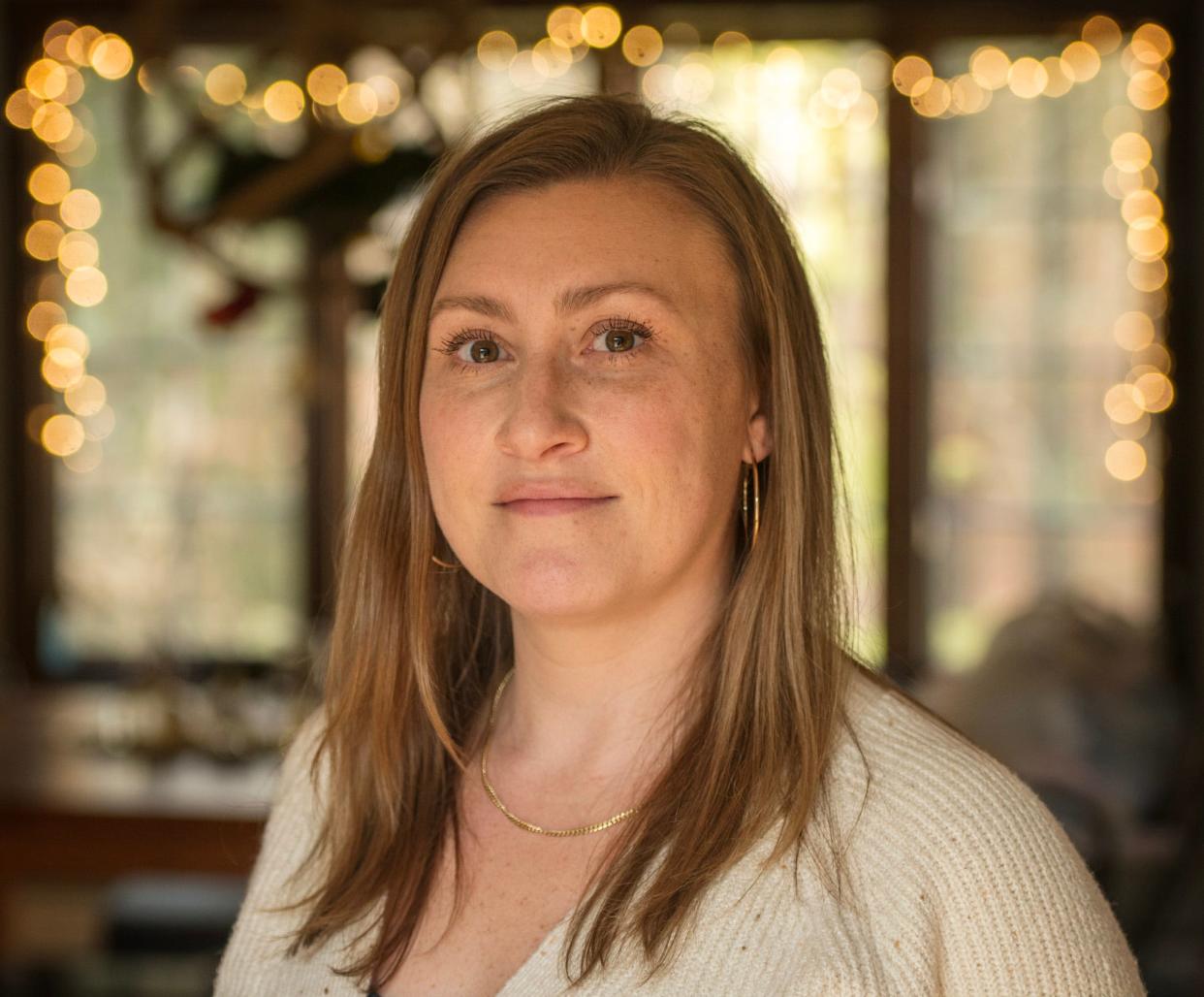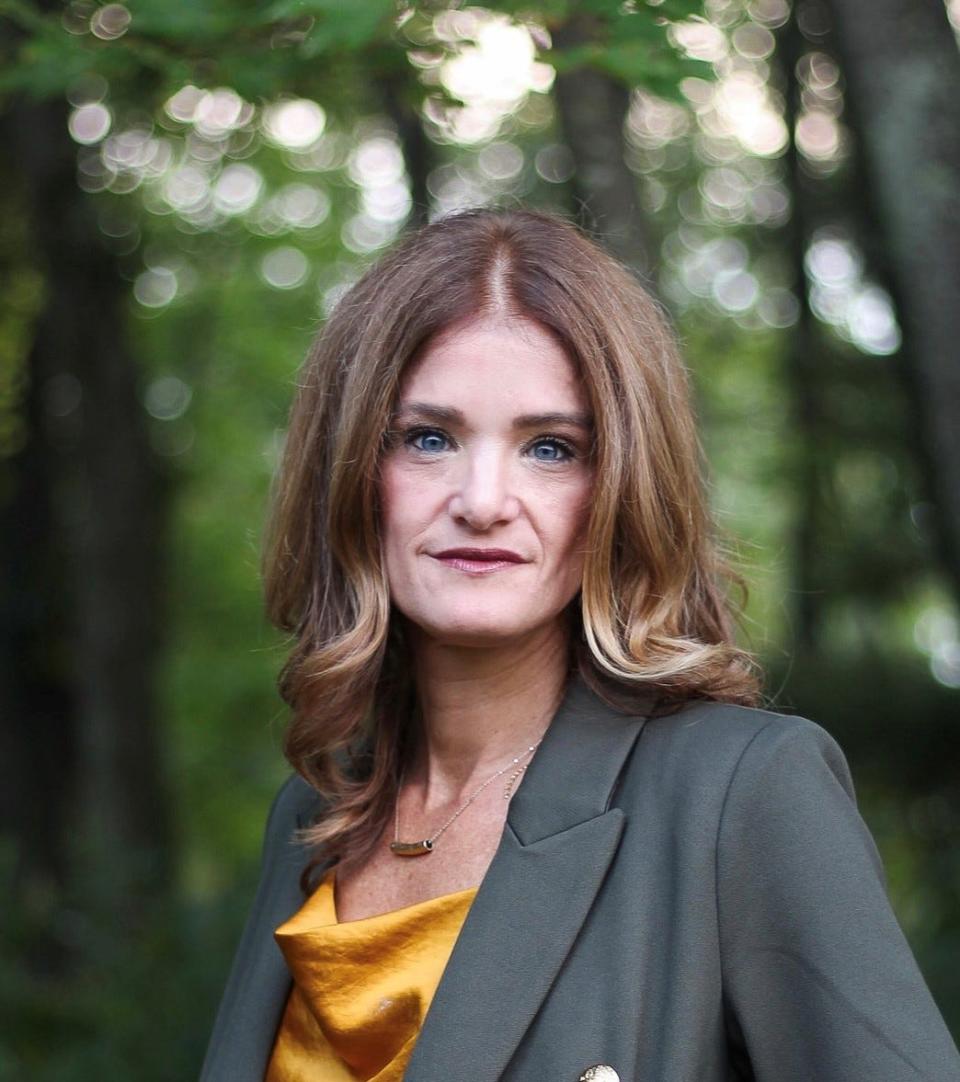One in 5 maternal deaths is due to mental health issues. What's the solution?

OAKHAM — Jennifer Ford knew there was something wrong after the birth of her second child, Mckinley.
It was a difficult labor and after four days in St. Vincent Hospital after an emergency cesarean section, Ford was back home in Oakham living a family life.
But within days, her mood changed: "All of a sudden the house didn’t feel like my house."
Ford had a hard time bonding with Mckinley, had fits of nonstop crying and her mood spiraled downward to the point that she contemplated suicide: “I felt like (my family) deserved better. That they would be better off without me being there.”
She shared those feelings with her husband, Andrew, and he immediately sprang into action. A call was made to Ford’s obstetrician and the eventual diagnosis was postpartum depression.
Ford was connected with the Massachusetts Child Psychiatry Access Program for Moms that supplied the mental health services she needed. Her medications were adjusted, she had immediate appointments with a psychiatrist and a social worker managed her care.
"After a few months, I noticed a change,” said Ford, who eventually realized the joy of her second child.
“After three months, I started to think that (Mckinley) is kind of cute. It hit me, ‘Wow, I can’t believe she’s 12 weeks old and I’m just having that thought now.’
“Before, it was like looking at someone else’s baby.”
Wished for talks about postpartum depression
Ford thinks it took about a year for her mood to bounce back to normal. She doesn’t fault her obstetrician for her struggles, but she wishes there had been direct conversations during pregnancy about the risks of postpartum depression.
Depression is something Ford has dealt with intermittently for years and in the back of her mind she wondered if her mood could shift during and after pregnancy. But she didn’t quite grasp the risks.
She talked to her obstetrician about continuing to take Zoloft during pregnancy, a drug prescribed for depression. But she doesn’t remember having a discussion with any medical provider about postpartum depression.
“I wasn’t adequately prepared for what comes after pregnancy. Discussion about mental health after pregnancy is lacking,” said Ford. “In hindsight, I think, 'Did I not do enough to prepare? What did I and the doctor miss?' I don’t know how to improve that.”
Access to care generally inadequate
Dr. Nancy Byatt, a perinatal psychiatrist at UMass Chan Medical School, said access to mental health care during and after pregnancy is generally inadequate.

To highlight the scope of the problem, Byatt said even if a woman is identified as having depression during a perinatal screen, fewer than 25% of those women get an initial mental health appointment. The perinatal period is generally defined as the weeks before birth and continuing through the first year of the baby’s life.
Another statistic to bring the challenge into focus is mental health conditions account for the greatest percentage (23%) of pregnancy-related deaths in the U.S., according to the U.S. Centers for Disease Control and Prevention.
At Family Health Center in Worcester, patients face increased risk for perinatal mental health conditions, said Stephany Giraldo Eierle, a doctor of osteopathic medicine and a primary care psychiatry fellow.
Many of the center’s patients are low-income immigrants and refugees. Pregnant mothers in this demographic can face socioeconomic challenges that can predispose them to mental health conditions.
“(Perinatal mental health) has been a huge topic for a long time that has not been getting the attention it deserves. But that’s starting to shift,” said Eierle.
Eierle's fellowship team is being trained in perinatal mental health. The team then trains primary care providers to screen, treat and connect patients to needed resources.
'Many barriers' to care
There are "many barriers" to accessing mental health services during and after pregnancy, said Byatt.
Some patients are uncomfortable talking about their struggles. If they bring them up, Byatt said some doctors don’t know what to do because they haven’t received proper training.
Supply and demand are at play. There aren’t enough psychiatrists and therapists to treat the number of women that need services. Even if the lot of providers increased significantly Byatt said, “We’re so in a hole that we’ll likely never catch up with demand."
Burnout is another reason, said Dr. Robert Zavoski, chief clinical officer at Family Health Center. Some doctors left medicine or retired, burned out before the COVID-19 pandemic. When the pandemic hit, it only exacerbated the problem.
Plus, many students in medical school want a work-life balance, so they choose a specialty with manageable work hours and less stress. As a result, many students aren't going into primary care or obstetrics, said Zavoski.
In addition, the training in medical schools in perinatal mental health is underwhelming, said Eierle, and it applies to residents in psychiatry.
Equity concerns are also in the fold. Patients with commercial insurance and those paying with cash have better access to services than patients with public insurance like MassHealth, the state’s Medicaid insurance program, and it comes with low reimbursements for care. As a result, many doctors don’t take public insurance, said Byatt.
What are the solutions?
Byatt said there’s a need for parity, so payments for mental health care match higher-level payouts for physical care. Policymakers, insurance companies and lawmakers will need to develop ways to make that happen, she said.
Sen. John Velis, D-Westfield, senate chairman of the Massachusetts Joint Committee on Mental Health, was not available for comment. State Rep. Adrian Madaro, D-East Boston, co-chairman of the committee, didn't return a request for comment.
Meanwhile, creative approaches are underway to boost access to mental health care. The Massachusetts Child Psychiatry Access Program for Moms is training providers statewide to better deliver mental health and substance use services. Byatt is the program’s founding medical director and the training is primarily focused on obstetric practices.
The program modeled after the Massachusetts Child Psychiatry Access Program for Moms is replicated in 28 U.S. states, funded by the federal Health Resources and Services Administration and state budgets.
In next month’s Lancet, Byatt said results from a research study will show an improvement in depression symptoms among patients in obstetric practices enrolled in the study. Byatt explained the study compared the Massachusetts Child Psychiatry Access Program for Moms to programs that combined the Massachusetts Child Psychiatry Access Program for Moms with depression care.
The study will also show higher treatment rates versus prior studies. Byatt shared results on this point:
● In the Massachusetts Child Psychiatry Access Program for Moms with depression care, 52% of patients initiated mental health treatment; 43% for the Massachusetts Child Psychiatry Access Program for Moms. Those percentages compared to Byatt’s earlier point that even if a woman is identified as having depression during a perinatal screen, less than 25% of those women get an initial mental health appointment.
● The study also showed follow-up rates of 25% for the Massachusetts Child Psychiatry Access Program for Moms with depression care and 20% for the Massachusetts Child Psychiatry Access Program for Moms.
“There’s still room for improvement, but it’s significantly higher than what we’ve seen in prior studies,” said Byatt.
Meanwhile, Byatt is part of a $21 million study funded by the Patient-Centered Outcomes Research Institute. It builds on the study published in the Lancet. Among the details: Of the 28 states using the Massachusetts Child Psychiatry Access Program for Moms, eight will be trained to use interventions in the study. Outcomes will be compared to interventions that also include peer support in obstetric practices.
In essence, a health care model will be compared to a health care model that includes a so-called "community partnership" that provides peer support.
Thankful and ready for the future
Ford is thankful she had a solid family support system to help her through her bout of postpartum depression. She plans to study nursing next year at Mount Wachusett Community College and is thinking about a career that helps postpartum mothers.
Ford has this advice for all mothers — don’t be afraid to ask for help if depression sets in during pregnancy.
“The first thing you need to be an excellent mom is to make sure all your needs are met. That’s the only way," she said.
Contact Henry Schwan at henry.schwan@telegram.com. Follow him on X: @henrytelegram.
This article originally appeared on Telegram & Gazette: More services to improve perinatal mental health care urged

